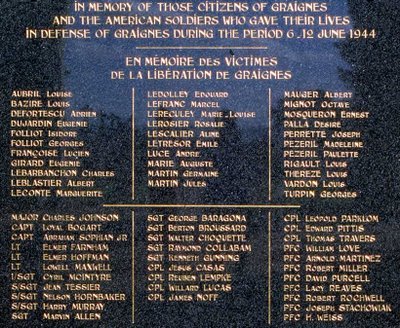June 6, 1944
On June 6, 1944, my grandmother’s brother Tommy, a paratrooper in the 82nd Airborne, was dropped behind German lines as part of the D-Day invasion of Normandy. Tommy was killed in action while defending the small French village of Graignes on June 11. What follows below is a transcription of a letter written to my great-grandmother by one of Tommy’s fellow paratroopers, a man named Charles Hammer from San Francisco. The details of the letter aren’t completely accurate—for example, Charles describes the town where Tommy was killed as being twelve miles east of Carentan, whereas Graignes is actually about nine miles south—but this photograph of the memorial confirms my uncle, Corporal Thomas Travers, as being listed among those killed in what is known as the Battle of Graignes:
It’s a rather famous battle, which can be read about at this link. Tommy, Charles, and 180 other mis-dropped paratroopers defended the town against the 17th SS Panzer Grenadiers Division. Reading about the battle—how hard the paratroopers fought against overwhelming odds, what became of the town and the people who helped them—adds heartbreaking depth and texture to Charles’s letter, him apparently being one of the paratroopers who survived.
I obviously never knew Uncle Tommy, but I was fortunate to know many others in my family who served during World War II both in Europe and the Pacific. Today has me thinking of all of them.
But Charles says it better:
Dear Mrs. Travers,
I received your letter of February 25. I was sorry to hear that you had the news of Tommy’s death so late after it happened. I could not tell you now if I were still over there. I have been in the hospital now for three months and now am on a boat heading home and I shall mail this just as soon as I get in the states.
No, I shall not come to see you for I don’t think it would work out right for you being the mother of Tommy, you would think, Now why couldn’t he be Tommy? I was going to see you but my letter will be all that I can do for I don’t think myself right in going to see you.
Tommy was killed in a small village called [Graignes] about twelve miles east of Carentan about 6:30 in the evening of the eleventh of June. He did not suffer none for as it was told to me by one of the fellows, Tommy and two of the others were killed outright. We were outnumbered but we held them off for more than two hours and Tommy was just like the rest of us scared but mad and we all stood by our guns till we were told to pull out.
I found out later that Tommy and the rest of our boys that we lost were buried by the French in the cemetery near the church and the time in which you were notified Tommy was missing and the time you were notified he was killed in action they had found his resting place and moved him to the 82nd Memorial Grounds in [Ste. Mère-Église].
That took the six months, Mrs. Travers, and I want to offer you my most humble apologies for the slowness of news of Tommy’s death. He was a good man and I am proud to say I fought with him. It was a shame that God had to take him just at the start of the real fight. But he and many others like him died so others could live in freedom. It was men like Tommy who have gone on and taken up where Tommy left off.
I could not have written you a letter like this back in England or France for it would not get through the sensors. We are not supposed to write home and tell of those we lost. They have their reasons, cruel and hard as it might be, but a fellow like myself has to abide by the rule or I would have written to all the Moms and Dads of the fellows I once knew. God has seen fit to spare me and I am humbly grateful.
I have told you all I know of Tommy’s death. He was a brave man and it’s men like him who are making the world safer for tomorrow.
Yours sincerely,
Charles




